This year I planted my first garden. By most measures, it’s an abysmal failure. Viewed from afar, the garden looks abandoned, nothing more than a fenced patch of weeds and stunted corn, but when you look closer, you can see a few crops that are thriving.
With such mixed results, I’m certainly not about to tell you how to grow a garden (unless you want to know what not to do). However, I did receive eight lessons in creative work during the time I spent playing in the dirt.
Before we start, here’s a picture of last week’s modest harvest (the bowl of wild blackberries came from the forest behind my house):
1. Inputs make all the difference. When you continue to plant the same things in the same place, eventually the nutrients are removed from the soil, resulting in plants that fail to thrive. Compost replaces these nutrients.
If you don’t know, compost is a rich, fertile, decomposed organic matter, and a cornerstone of organic/sustainable gardening. You make compost by mixing carbon (dead leaves, straw, etc) and nitrogen (fresh cut grass, veggie scraps) in a 30:1 ratio and letting it all break down.
For me, creativity works the same way. I need brain fertilizer. Too much work without new inputs gives me results similar to my corn: wilted, stunted, and a bit yellow. My favorite brain fertilizers include
- challenging literature
- great music & film
- conversations with friends old and new
- regular hiking & walking
- travel (international or otherwise; whatever puts me in a new place).
2. Experiments Will Surprise You. Not long after my pumpkin plants sprouted, I put down a mulching layer of cardboard + straw around half of them as an experiment. Within two weeks, the mulched pumpkin plants were about 30% larger than their non-mulched counterparts. Needless to say, I mulched the remaining pumpkin plants, but they still lag behind in size. The plant on the left wasn’t mulched until the day I took this photo:
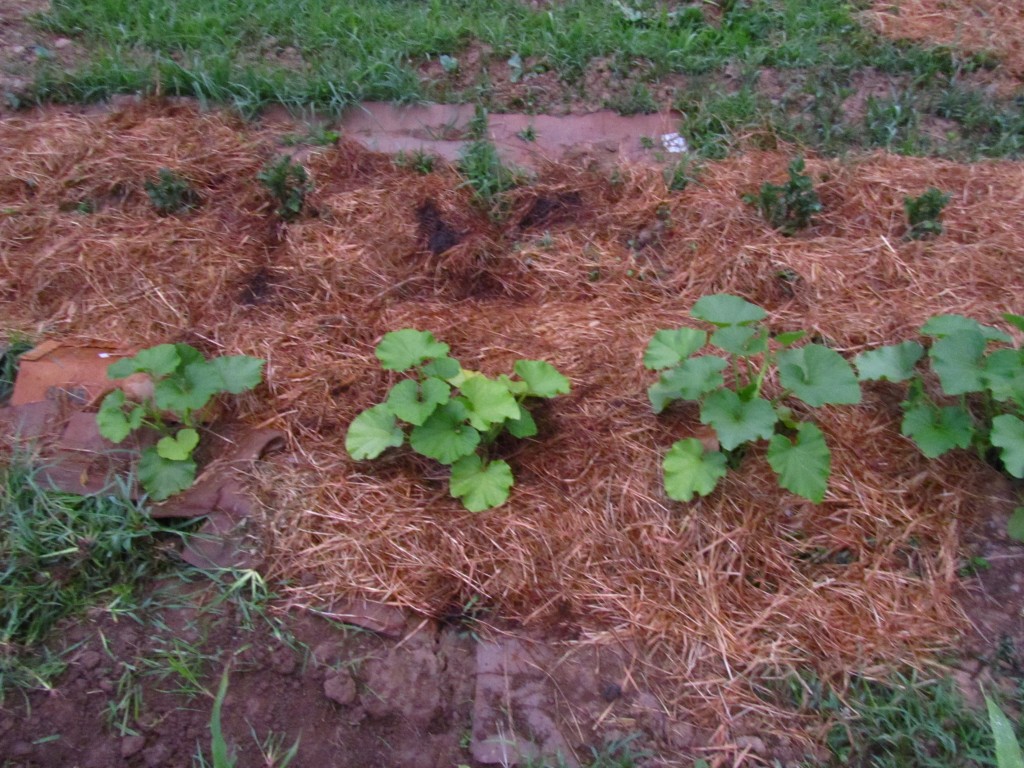
How does this apply to creative work? During the months of April and May, I kept a daily time log. During March and June, I let my time logs slide. Also, as a part of my weekly review, I tracked my task completion percentages.
The difference in the results are striking: in March, I completed 34% of the tasks that I started. In April, I completed 65%. In May, this number increased to 74%. In June, this number plummeted to 26%.
Yes, these numbers are totally nonscientific and subject to my own moods, whims, and interests, but I can’t deny the results that are staring me in the face: I’m much more likely to finish what I start when I keep track of my time.
3. More work early makes things easier later. Overall, my garden is a sloppy mess of weeds, consisting of too much unused space and stunted yellow corn. However, a couple spots are thriving with little weeding or tending required on my part.
Why? Because I put in a lot of work early in the season, creating an outstanding soil mixture (for the raised beds) and aggressively mulching with straw and cardboard. My pumpkins and cantaloupes are threatening to take over the garden, and I have more squash than I know what to do with.
The areas where I did the least work early on are the ones now overrun with weeds.
Creative work is no different. Upfront preparation gives you a chance to really figure out what you’re doing before you really start. Preparation includes things like
- prewriting and outlining (for writers)
- journaling
- mind mapping
- systems creation
- end-result visualization
I’m a worse entrepreneur than I am a gardener, but the projects I’ve started with a nearly-complete business plan don’t fizzle out in the same way those seat-of-the-pants, back-of-the-napkin projects do.
Upfront preparation will give you the momentum required to keep going, even when you begin to lose interest, because you’ve already done most of the mental heavy lifting.
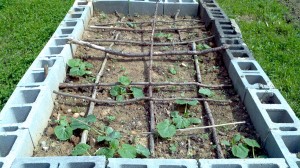
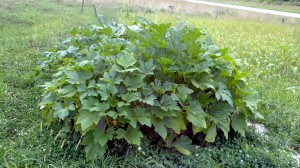
4. Start Early. Had I started preparing my garden last winter (by composting, solarization, and planting a cover crop), I’d have much higher yields from my row crops, as I’d have fewer weeds and better soil.
Had I started writing seriously in my teens and early twenties (instead of dabbling), I’d not have to work so diligently now to improve my writing. Had I learned more efficient ways to practice music a decade ago, I’d be a far better musician than I am. An early start would’ve given me that much more experience in both these skills.
Starting early also means starting early in the day; the labor of tilling, digging, planting, pulling weeds, etc., is much easier before the summer sun has turned the outside world into a sweat lodge.
When I do my creative work in the morning (as opposed to working on it late in the day), I find everything just flows better because I’m fresh and not yet exhausted by the efforts of the day.
5. Just Start. Even though I got a late start doesn’t mean my garden wasn’t worth starting. Even with a ready-fire-aim approach, I’m up to my elbows in squash and expect to have enough pumpkins, cantaloupes, and tomatoes for at least one trip to the farmer’s market.
Like your creative projects, a garden won’t grow itself. There are perfect, optimal, and suboptimal times to start, but if you find the techniques that work for you, you can start any time. The perfect start time will never come. Even now, this late in the summer, I’m planning to do another raised bed in order to have a fall crop of kale and spinach.
And even now, with a baby on the way and full-time employment looming, I’m working hard to launch a new fiction website and cobble together some kind of performance mini-career.
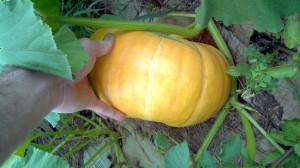
6. Choose Your Projects Wisely. I planted about 50 cabbage plants, 6 in a raised bed and the remaining 44 in rows. I still have all my cabbage in the raised beds, but only about 10 row cabbage remain, and they’re all sickly.
Why? Because I am not excited about cabbage, (Is anyone?) Yes, I look forward to making kimchi and sauerkraut, but come on: I’m not going to put that much effort into cultivating cabbage. On the other hand, my pumpkins and cantaloupe are all thriving because I’m excited about eating them.
If your creative work doesn’t excite you, it will suffer from neglect and disinterest.
When I was a more active freelance writer, I took a couple jobs only because they paid well, not because I was excited about them, and needless to say the results were sub-par. My client was satisfied, but the results weren’t anything I’d want in my portfolio.
7. Sometimes it’s better to let things go. In both gardening and creative work, it’s easy to get too ambitious and find your projects getting away from you. When this happens, the best decision is to simply abandon that which drains you.
In my garden, this includes entire rows of jalapenos, cabbage (again, poor cabbage), and basil. Had I tried to keep up with these crops, I would’ve exhausted myself (probably to the detriment my favored crops).
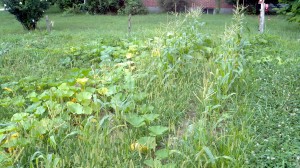
I have a couple websites that have gone the way of the cabbage: neglected and untended, potentially profitable but just not that exciting. I’ve also abandoned writing projects of the same reason: the input and energy required far exceed the potential payoff, especially with other Shiny Objects beckoning.
8. Good Fences Protect Your Work. My garden is surrounded by an electric fence. This fence does a reasonably good job of keeping deer and other critters out (it’s just low enough to shock the ears of bunnies). Building it required a lot of upfront work, but the payoff is nothing eats away at my crops.
Think of potential distractions like email, text messages, web browsing, reactive work, etc., as deer and other woodland crop-munchers. They want to eat away at your time, attention, and focus. Your projects will die from a thousand tiny nibbles if you let these in.
Build a fence around your creative time, ideally one that shocks intruders. If you (and others) respect your fence, you can be sure that whatever you’re working on will be able to grow to its full potential. Let nothing in.
Finally…
Next year, I’ll keep a garden, but with a few key differences. I will…
- only plant crops I’m excited about (sorry cabbage)
- expand my raised beds and maybe setup a drip irrigation system
- hire someone to help me with some of the upfront work.
- focus on methods that give me the best results
Update: I start full-time employment next week. Excited!
Leave a comment and tell us…
What are your inputs?
What experiments do/could you use to measure your creative output (against a control)?
If you have a garden, what are you growing?

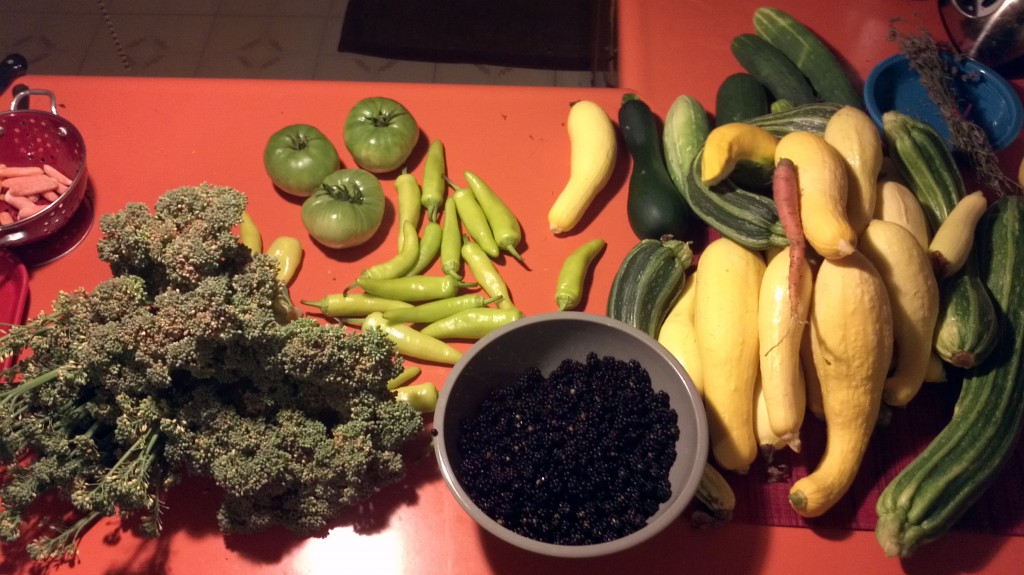
Comments on this entry are closed.
Great post, Seth. Congratulations on finding full-time employment as well.
Here are some thoughts:
Poor rabbits.
You’re right. Cabbage is boring.
I’m trying to grow a viable income in my figurative garden, but I’m not sure I am planting the right seeds or growing the right vegetables. Some days, I think the heat is too much for me to bear.
I remember very productive days during my last semester of undergrad. My mind was more active and alive than it had ever been before. I had a plan for nearly every hour of the day, mostly out of necessity since my garden was experiencing many challenges (21 credit hours, 30 working hours, a floundering relationship, among other things). If I hadn’t planned, things would’ve crumbled. In the end, I didn’t accomplish everything I hoped, but I did get a degree and achieved high marks, which were the main goals. Sometimes I think I’m not challenging myself enough and that’s the reason for my malaise. I need to imperil myself to boost my productivity. Surely there must be another way to accomplish things.
Great garden analogy. I especially love the part about the electric fence. Picturing Facebook with singed ears is quite satisfying.
I have a balcony garden. I’ve never been able to grow tomatoes in the past. They always fried from the western exposure and above 100 degree temps. I decided to try one more time. Funny thing – I realized keeping them watered really helps.Who knew? Now if I can just figure out how watering fits into this analogy I may make some real progress. *blank stare* nope, I got nothing.
Great post. Nice harvest. Give mama a foot rub and enjoy those blackberries.
I’m not a gardener but, your article was excellently written. I can definitely see the connections.
Looking forward to reading more.
Thanks Bryce!
I love this article. I’m motivated.